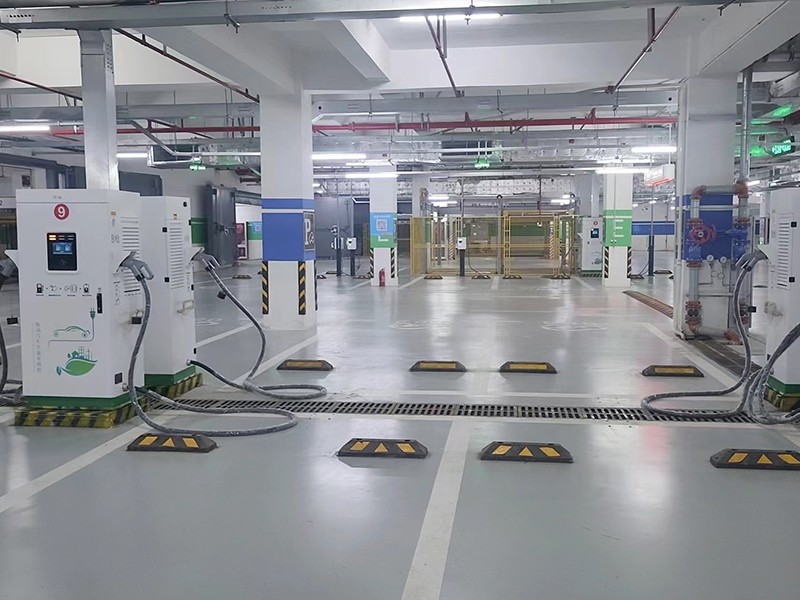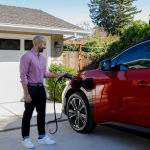Electric vehicle (EV) drivers pay for energy by the kilowatt-hour (kWh), much like an electric appliance. In the U.S., the average home electricity rate is about 16–17¢/kWh. That means driving 100 miles in an EV (roughly 3–4 miles per kWh) might use 25–33 kWh, costing only $4–$5 at home. By comparison, gasoline at ~$3.20/gal costs ~ 12¢ per mile for a 30 mpg car, so EVs typically enjoy significantly lower “fuel” costs. In fact, one analysis found charging ~1,200 miles per month costs ~$66 at home (about $0.055/mile), versus ~$114 for gas in a 30 mpg car. Overall, most EV charging is much cheaper than refueling – especially overnight at home when electricity is cheapest.

Home Charging Costs
At home, you pay your local residential rate. The U.S. national average is about 16.44¢/kWh, but it varies widely by state (e.g. ~10.2¢ in North Dakota vs ~42.7¢ in Hawaii). To estimate cost, multiply the EV’s energy use by your rate. For example, if you drive 1,000 miles per month in an EV getting ~3.5 mi/kWh, you’d use ~285 kWh. At 16.44¢/kWh, that’s about $47 of electricity. If your rate is higher or lower, adjust accordingly.
-
Annual mileage: U.S. drivers average ~14,500 mi/yr. At 3–4 mi/kWh, that is ~4,000–5,000 kWh/yr. At $0.1644/kWh, charging 14,489 mi/year costs ~$786 (roughly $66/month as noted above).
-
Cost per mile: This works out to ≈ $0.03–$0.06 per mile at home. For example, 402 kWh (used for ~1,207 mi) cost $66.09, or about $0.055/mile.
-
Time-of-use (TOU) rates: Many utilities offer lower rates at night. EV owners can save by charging off-peak. For instance, one utility (PECO, PA) charges ~$0.20/kWh on-peak versus just $0.04–$0.06/kWh overnight. Smart chargers can auto-schedule to capture these cheap hours.
-
Efficiency losses: Charging isn’t 100% efficient. Expect roughly 10–15% energy overhead due to conversion losses. So a 60 kWh battery might actually require ~66–69 kWh from the wall to fill.
-
Charging equipment: Most homes use a 240 V Level 2 charger (~7–11 kW). The charger draws more power (and costs more per hour) than a standard wall outlet, but still the cost per kWh is simply your utility rate. (On-grid solar/home battery can reduce net cost further, if available.)
Public Charging Costs (Level 2 vs. Fast)
Public chargers (in parking lots, malls, highway stops) tend to be more expensive than home electricity. Pricing varies by charger type and network, but typical ranges are:
-
Level 2 public charging (240 V AC) – slower charging (adds ~25–30 miles range per hour). Many L2 stations charge by kWh at roughly $0.10–$0.30 per kWh. For example, at $0.20/kWh, adding 20 kWh (≈80 miles) costs $4.
-
DC Fast Charging (Level 3) – much higher power (50–350 kW), adds 60–100+ miles in 20–30 minutes. DC fast rates are higher: on average $0.20–$0.50 per kWh. AAA data shows the national average for all public charging (L1/L2/DC combined) is about $0.346/kWh. Stable Auto data (Q4’24) puts the average DC fast rate around $0.45/kWh. That means a 50 kWh top-off (200 miles) could cost ~$10–$25 at an L2 station, or $10–$22 at a DC fast charger (e.g. 50 kWh×$0.20–$0.45).
In practice, your cost depends on the network:
-
Electric vehicle networks: Companies like Electrify America, EVgo, ChargePoint, etc. each set their own rates. For example, Electrify America’s default rate is about $0.48/kWh (with a $7/mo “Pass+” subscription lowering it to ~$0.36/kWh). A common rate at EA chargers is ~48¢/kWh. So adding 50 kWh (≈200 miles) would be $24, or $18 with the discount pass.
-
Tesla Superchargers: Tesla’s network averages roughly $0.25/kWh (though it ranges widely, ~$0.11–$0.60 across locations). That translates to about $15–$25 to add ~60–100 miles of range. On average, a full 50–60 kWh top-off at a Supercharger costs $6–$30 depending on model and station.
-
Station fees: Some networks add session or idle fees (per minute) on top of per-kWh rates, especially if your car stays plugged in after charging. Always check the payment terms; many drivers minimize idle time to avoid extra charges.
Key comparison: Home vs public. Charging at home (~$0.16/kWh) is by far the cheapest option. Public Level 2 is roughly 1.5–2× home rates, and DC fast 2–3× higher. For example, 100 miles might cost ~$4–5 at home vs ~$10–$20 at a fast charger. As Kelley Blue Book notes, 1,207 miles cost ~$66 at home but ~$201 if charged entirely at 50¢/kWh fast stations. (Of course, few drivers rely entirely on public charging – it’s typically used for road trips or when away from home.)
Factors Affecting Charging Cost
Several factors influence what you ultimately pay for EV charging:
-
Electricity Rate and Plan: Your local utility rate (cents/kWh) is the biggest factor. As noted, the U.S. residential average is ~16.4¢, but state rates range from ~8¢ to >30¢. In addition, time-of-use (TOU) plans can make a big difference. Charging at off-peak times (often overnight) can drop the effective rate dramatically. (For example, one utility offers as low as $0.04/kWh overnight vs $0.20 peak.) If your home plan has EV-only TOU pricing, use a smart charger to take advantage.
-
Charger Type and Efficiency: Charging efficiency (conversion losses) means you pay for more than just the battery capacity. Typical losses are around 10–15%. Tests show a 105 kWh battery might need ~125 kWh input (20% loss) on a 22 kW charger, though ~15% is common. DC fast charging bypasses the onboard converter and typically wastes only ~10%. In short, expect to pay for ~1.1× the kWh you put into the battery.
-
Vehicle Efficiency (miles/kWh): How efficiently your EV uses electricity affects cost per mile. Many EVs get ~3–4 mi/kWh, though highly efficient models can exceed 4 mi/kWh. The higher your efficiency, the fewer kWh (and dollars) you need per mile. For example, at 4 mi/kWh and $0.16/kWh, 100 miles costs $4; at 3 mi/kWh it costs $5.33.
-
Battery Size and State of Charge: Larger batteries cost more to fill. If you top off a 60 kWh pack from 10% to 80% (≈42 kWh), that costs ~$6.90 at $0.164/kWh, versus ~$16.80 at $0.40/kWh. Charging to 100% often costs disproportionately more (tail-end charging is slower and less efficient). Many owners charge to ~80% to balance cost and time.
-
Location and Network Fees: Different charging networks may have extra fees or require memberships. As mentioned, subscriptions (EVgo Prime, EV Pass, etc.) can cut per-kWh costs. Free chargers exist (at some workplaces, malls, etc.), but they’re rare. Also note that DC fast stations may charge by the minute under some plans or states; this favors EVs that can charge quickly (those that can use the full power).
Home vs Public Charging: A Quick Comparison
-
Cost per kWh: Home ~10–20¢/kWh (depending on utility); Level 2 public ~10–30¢/kWh; DC fast ~20–50¢/kWh. Tesla Superchargers average ~$0.25/kWh.
-
Cost per 100 miles: At 4 mi/kWh, 100 miles = 25 kWh. Home (16¢) ≈ $4.00. L2 public (25¢) ≈ $6.25. DCFC (40¢) ≈ $10.
-
Average bill: For a US household, adding a typical EV (1,200 mi/mo) might raise the electricity bill by ~$50–70. Public charging is optional and often supplementary.
-
Speed: Home/Level 2 is slower (hours for full charge) but inexpensive. Fast chargers fill quickly (minutes for a partial charge) but cost more per kWh.
Commercial & Fleet Charging Costs
For businesses and fleet operators, charging costs include all the above factors plus special considerations:
-
Demand Charges: Commercial electricity bills often include demand charges ($/kW for peak power). A high-power EV fast-charger can spike demand, triggering large fees. In some cases, demand charges can dominate the electricity cost (as high as ~90% of the bill). For example, if a site’s demand limit is 100 kW but a charging spike hits 250 kW and the utility’s demand rate is $20/kW, that single event adds $(250–100)×$20 = $3,000 in demand charges. Fleet planners must manage this risk by staggering charging times, installing load management, or adding onsite storage to shave peaks.
-
Time and Scheduling: Fleets can take advantage of TOU pricing by charging overnight or off-peak, just like home owners do. Some utilities even offer special off-peak EV rates for commercial customers. Coordinating a fleet to spread its charging load can dramatically reduce costs.
-
Billing and Incentives: Many utilities now offer EV-friendly commercial rates or rebates. For example, New York utilities have programs to rebate a portion of demand charges for EV fleets. (Check with your local utility for EV-specific tariffs or incentives.) Without such programs, simultaneous charging of many vehicles can “erase” the fuel-cost advantage of EVs if demand fees become large.
-
Installation Costs: Although not a per-kWh cost, installing high-power chargers (and any required transformer upgrades) is a capital expense that fleets must amortize. Government incentives (tax credits, grants) can offset these up-front costs.
-
Scale Efficiency: On the plus side, a large fleet that centralizes charging (e.g. at a depot) can negotiate better rates or install renewable generation. Bulk energy purchases, solar + battery systems, and advanced energy management systems can lower the effective cost per kWh.
Tips to Reduce EV Charging Costs
-
Charge at Home Whenever Possible: Home rates are usually cheapest. Plan trips to minimize public fast-charging.
-
Use Off-Peak Hours: Whether at home or work, plug in overnight. Take advantage of TOU rates or overnight EV plans.
-
Join Charging Networks: If you use public chargers often, sign up for network plans (EVgo Prime, Electrify Pass+, ChargePoint membership, etc.) to get discounted kWh rates.
-
Monitor Charger Prices: Apps like PlugShare or others let you compare costs at nearby stations (some chargers show price per kWh upfront).
-
Efficient Driving: Maximize your miles/kWh through gentle driving, regen braking, and proper tire inflation – every extra mile per kWh lowers your cost per mile.
-
For Fleets: Implement smart charging software to stagger vehicle plugs. Consider on-site batteries or solar to offset peak loads. Explore utility programs for EV fleets (demand-charge holidays, special tariffs, etc.).
Conclusion
In summary, charging costs vary widely by where, when, and how you charge. In the U.S. today, home charging averages roughly $0.04–$0.05 per mile (at ~16¢/kWh and 3.5 mi/kWh). Public charging can be 2–3 times more expensive on a per-mile basis, but it provides speed and convenience. Overall, even paying for fast charging, EVs often cost significantly less per mile than gasoline. By planning charging times, using affordable networks, and scaling intelligently for fleets, U.S. drivers and businesses can maximize these savings.
Sources: U.S. average rates and examples from EIA and industry reports; typical public charging prices from industry surveys; cost comparisons and usage examples from Kelley Blue Book and AAA; TOU and demand charge insights from utility and industry analyses.


